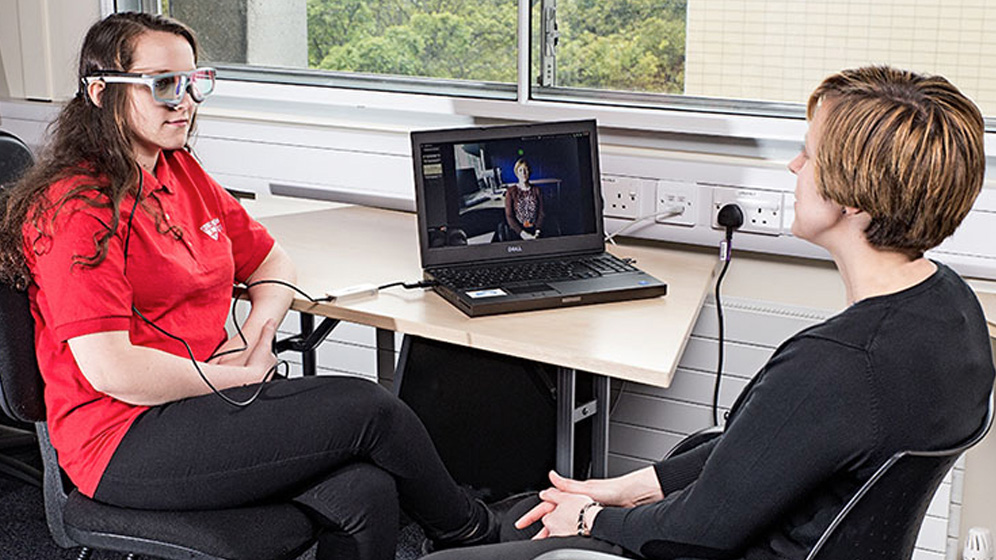Psychology BSc Honours
- UCAS code: C800
- Full time
- 3 years
This professionally accredited degree will equip you with an in-depth understanding of the fascinating field of psychology, and how to apply your knowledge in a real-world setting.
You are currently viewing course information for entry year: 2026
Next start date:
- September 2026
UCAS Institution name and code:
- NEWC / N21
Course overview
This three-year Psychology BSc Honours degree will give you a head start in your professional career. With a unique range of professional pathways and hands-on learning, you're able to shape your undergraduate degree. You will also have the opportunity to complete a placement or study abroad year. You can apply for this after you have completed your first year.
Your teaching will be informed by internationally recognised research, much of which is delivered in the purpose-built, state-of-the-art Dame Margaret Barbour building where facilities include:
- a forensic interviewing suite
- a cognition and behaviour lab
- a nutrition and food preference unit
- medical consultation rooms
- psychological testing cubicles
You'll initially study a broad range of topics. These cover the core areas of psychology such as social psychology, biological psychology, research methods, individual differences, cognitive psychology and developmental psychology. As you progress through the degree you will be able to focus more on your specific interests, with optional modules that represent the expertise of our staff.
A degree from the School of Psychology truly provides an education for life. We train our students to think critically about evidence and the world around them. We also train them to be ethical psychologists and ethical citizens.
We provide evidence-based extracurricular opportunities to help students develop personal and professional skills. Our peer-led anti-perfectionism workshops draw on the expertise of our sports psychology team. The aim is to reduce detrimental perfectionistic tendencies in students.
To achieve graduate level skills, our programme will push you beyond your comfort zone as you adapt to new and independent ways of teaching and learning.
If you are interested in studying Psychology within a more interdisciplinary programme, you might consider the BSc in Cognitive Science.
READ MORE
Your course and study experience - disclaimers and terms and conditions
Please rest assured we make all reasonable efforts to provide you with the programmes, services and facilities described. However, it may be necessary to make changes due to significant disruption, for example in response to Covid-19.
View our Academic experience page, which gives information about your Newcastle University study experience for the academic year 2025-26.
See our terms and conditions and student complaints information, which gives details of circumstances that may lead to changes to programmes, modules or University services.
Quality and ranking
Professional accreditation and recognition
All professional accreditations are reviewed regularly by their professional body.
Modules and learning
Modules
The information below is intended to provide an example of what you will study.
Most degrees are divided into stages. Each stage lasts for one academic year, and you'll complete modules totalling 120 credits by the end of each stage.
Our teaching is informed by research. Course content may change periodically to reflect developments in the discipline, the requirements of external bodies and partners, and student feedback.
Optional module availability
Student demand for optional modules may affect availability.
Full details of the modules on offer will be published through the Programme Regulations and Specifications ahead of each academic year. This usually happens in May.
To find out more please see our terms and conditions
During your first year, you'll receive a broad introduction to core areas of psychology. You'll also develop core skills in research methods, data analysis and psychological literacy.
You'll study topics such as:
- developmental psychology
- social psychology
- cognitive psychology
- sensation and perception
- evolution and genetics
- individual differences
- mental health
Modules
In Stage 2, you'll start to specialise in the areas that interest you most.
You'll study core topics including:
- developmental psychology
- individual differences
- biological psychology
- social psychology
- cognitive psychology
- research methods and data analysis
You'll also be able to choose from optional modules covering topics such as:
- perception
- evolution and behaviour
- animal cognition
- clinical psychology
- health psychology
Modules
| Optional Modules | Credits |
|---|---|
| Perception | 10 |
| Introduction to Comparative Cognition and Behaviour | 10 |
| Pathways and Therapies in Clinical Psychology | 10 |
| Psychology for Sport Performance | 10 |
In Stage 3, you can tailor your degree using a variety of optional modules.
You'll design and carry out your own empirical study with expert-led supervision in an area of psychology.
You'll also have the opportunity to explore further areas of interest including:
- the psychology of religion
- the damaged brain
- psychology for sport performance
- neurodiversity of development
- consumer psychology
There are no module restrictions, allowing you to study areas that interest you the most, preparing you for the next steps in your chosen career.
Modules
| Compulsory Modules | Credits |
|---|---|
| Psychological Enquiry 3: Psychological Literacy and Professional Skills | 10 |
| Empirical Project | 30 |
We base these figures and graphs on the most up-to-date information available to us. They are based on the modules chosen by our students in 2024-25.
Teaching time is made up of:
- scheduled learning and teaching activities. These are timetabled activities with a member of staff present.
- structured guided learning. These are activities developed by staff to support engagement with module learning. Students or groups of students undertake these activities without direct staff participation or supervision
Teaching and assessment
Teaching methods
You'll be taught through a combination of:
- lectures
- seminars
- workshops
- computer based lab sessions
- practical sessions
- field work
Assessment methods
You'll be assessed through a combination of:
-
Case studies
-
Dissertation or research project
-
Essays
-
Examinations – practical or online
-
Group work
-
Presentations
-
Reflective report/journal
-
Reports
-
Seminar tasks/exercises
Skills and experience
In addition to the key concepts and principles of Psychology, our programme provides you with a broad range of graduate skills known as Psychological Literacy. You'll be able to transfer these skills to professional, societal and personal settings.
Psychological Literacy
You'll learn research related skills including how to:
- formulate hypotheses and research questions
- carry out psychological research
- utilise the management and visualisation of data sets
- use appropriate data analysis methods
- write up research reports
Through our School’s work on humanising our psychology curriculum, you will develop your ethical understanding and intercultural competence. You'll do this both as a scientist and as a citizen. You'll learn how to apply critical thinking and problem solving skills, and develop the capacity to self-reflect.
Opportunities
Professional Placements
Subject to eligibility, students can apply for a professional placement between Stage 2 and Stage 3 of their programme. The School of Psychology placement team secure and advertise a wide range of placements. Examples of previous placements have been in the NHS Foundation Trust, Northumbria Police, University research institutes and local mental health support charities. National placement opportunities are also advertised, for example, at Great Ormond Street Hospital. If successful in being offered a placement, students are supported by the placement team whilst preparing for and undertaking their placement. Placements are an excellent opportunity for students to apply the knowledge and skills they have learned in a practical context. They are an opportunity to gain an important advantage in a competitive job market.
Study Abroad
As part of your psychology degree, you have the opportunity to study abroad for a year at a University in a different country. Currently, we have partnership agreements with Universities in North America, Canada and Sweden. We are also continually expanding our global study opportunities. The international study year takes place between Stages 2 and 3. To join the international study you need to apply for a place and numbers are limited.
Find out more information on studying abroad. Further information will also be provided during your course.
Careers Placements
Get career ready with a work placement and leave as a confident professional in your field. You can apply to spend 9 to 12 months working in any organisation in the world. You'll receive University support from our dedicated team to secure your dream placement. Work placements take place between stages 2 and 3.
You'll gain first-hand experience working in the sector, putting your learning into practice and developing your professional expertise.
If you choose to take a work placement, it will extend your degree by a year. Your degree title will show you have achieved the placement year. Placements are subject to availability.
Facilities and environment
Facilities
As a psychology student at Newcastle University, you'll be based in the School of Psychology in the Ridley Building, in the University's city-centre campus.
As well as having great access to University facilities like its libraries, student's union and sports centre, the School of Psychology is less than 10 minutes' walk from Newcastle city centre and all of its shops, restaurants, cafes and bars.
You'll also have access to our excellent practical facilities, such as:
- a forensic interviewing suite
- a nutrition and food preference unit
- a media and behaviour lab
- medical consultation rooms
- psychological testing cubicles
Support
You will have an academic member of staff as a personal tutor throughout your degree. They can help with academic and personal issues.
All first-year students join a study group of approximately 15 students, led by an experienced and trained final-year Psychology student who will also act as your Peer Mentor for your first year.
Your future
Opportunities for diverse career paths
As a psychology graduate, you'll be incredibly versatile. You'll have plenty of transferable skills, including analytical thinking, research skills, strategy development, problem solving, and content writing skills. Recent graduates have gone on to secure employment in areas of professional psychology, such as clinical psychology, forensic psychology, and educational psychology. These have been in organisations such as the NHS, the Home Office, HMRC, Prison Service, and local, national, and international charities.
Many of our graduates embark on further study, including master's degrees and PHDs in areas of psychology and related disciplines. Some go on to pursue careers in academia and research.
The versatility of psychology graduates means that many graduates go on to work in a variety of fields. They include:
- teaching
- consumer behaviour
- data analysis and research
- human resources
- charities
- financial services
Make a difference
Sorry, you need JavaScript to view this video
Careers support
Our Careers Service is one of the largest and best in the country, and we have strong links with employers. We provide an extensive range of opportunities to all students through our ncl+ initiative.
Visit our Careers Service website
Recognition of professional qualifications outside of the UK
If you’re studying an accredited degree and thinking about working in Europe after you graduate, the best place to find current information is the UK Government’s guidance on recognition of UK professional qualifications in EU member states. This official resource explains whether your profession is regulated in another country, what steps you need to take, and which organisation you should contact.
Entry requirements
All candidates are considered on an individual basis and we accept a broad range of qualifications.
The entrance requirements and offers below apply to 2026 entry.
| A-Level | |
|---|---|
| International Baccalaureate | |
|---|---|
Other UK and the Republic of Ireland qualifications
Alternative offers at Newcastle
Through one of our contextual or alternative offer routes, you could receive an offer of up to three grades lower than the typical requirements.
Contextual offers
We use certain contextual data from your UCAS form, alongside your application, to consider challenges that you may have faced in your education and the potential effect this may have had on your qualifications. This means you may be eligible to receive a lower contextual offer.
PARTNERS offers
One of the largest and longest support entry routes to university of its kind for students from underrepresented backgrounds. We support applicants from application through to study.
Realising Opportunities offers
A unique programme delivered in collaboration with 10 leading, research-intensive universities in the UK. The programme is open to students in Year 12/first year of college.
Pathways to Newcastle offers
Pathways to Newcastle, our national skills entry route, is available for specific subject areas.
High Performance Athletes
We support promising athletes at the application stage, who compete in regional, national or international levels in their sport.
Qualifications from outside the UK
English Language requirements
Entrance courses (INTO)
International Pathway courses are specialist programmes designed for international students who want to study in the UK. We provide a range of study options for international students in partnership with INTO.
These courses are specifically designed for international students who want to study in the UK and progress onto one of our undergraduate degrees. Our International Study Centre, has a range of study options including:
- International Foundation
- International Year One
- English Language courses
Find out more about International Pathway courses
Admissions policy
This policy applies to all undergraduate and postgraduate admissions at Newcastle University. It is intended to provide information about our admissions policies and procedures to applicants and potential applicants, to their advisors and family members, and to staff of the University.
University Admissions Policy and related policies and procedures
Credit transfer and Recognition of Prior Learning
Recognition of Prior Learning (RPL) can allow you to convert existing relevant university-level knowledge, skills and experience into credits towards a qualification. Find out more about the RPL policy which may apply to this course.
Tuition fees and scholarships
Tuition fees for academic year 2026-2027
The 2026 entry home fees have not yet been confirmed.
| Qualification: BSc Honours | |
|---|---|
|
Home students full time 3 years |
Tuition fees (Year 1)
Not set |
|
International students full time 3 years |
Tuition fees (Year 1)
30,900 |
Year abroad and additional costs
For programmes where you can spend a year on a work placement or studying abroad, you will receive a significant fee reduction for that year.
Some of our degrees involve additional costs which are not covered by your tuition fees.
Scholarships
Find out more about:
Open days and events
You'll have a number of opportunities to meet us throughout the year at our on-campus and virtual open days.
You'll be able to:
- explore our beautiful campus
- find out about our vibrant city
- discover what students think about studying at Newcastle
You'll also have the opportunity to speak to academic staff and find out more about the subjects you're interested in.
Find out about how you can visit Newcastle in person and virtually.
We regularly travel overseas to meet with students interested in studying at Newcastle University. Visit our events calendar to find out when we're visiting your region.
How to apply
Apply through UCAS
To apply for undergraduate study at Newcastle University, you must use the online application system managed by the Universities and Colleges Admissions Service (UCAS). All UK schools and colleges, and a small number of EU and international establishments, are registered with UCAS. You will need:
- the UCAS name and institution codes for Newcastle University (NEWC/N21)
- the UCAS code for the course you want to apply for
- the UCAS 'buzzword' for your school or college
If you are applying independently, or are applying from a school or college which is not registered to manage applications, you will still use the Apply system. You will not need a buzzword.
Apply through UCASApply through an agent
International students often apply to us through an agent. Have a look at our recommended agents and get in touch with them.
Get in touch
By phone
Call us on +44 (0) 191 208 3333 and press option 1. Our opening hours are Monday to Friday 10am until 4pm.
Live chat
Our NCL chatbot might be able to give you an answer straight away. If not, it’ll direct you to someone who can help.
You'll find our NCL chatbot in the bottom right of this page.
Online
Chat to our students
Choosing a university is a big decision. If you've got questions about a particular course, student life or the city of Newcastle, why not chat to our friendly students or graduates!
Keep updated
We regularly send email updates and extra information about the University.
Receive regular updates by email











